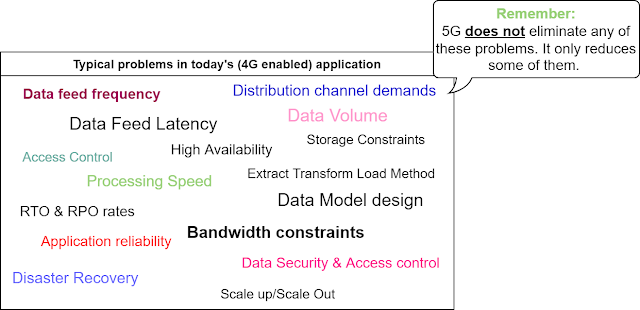5G: What does it mean to me?
A lot of different things come to mind when I think of 5G. The capabilities it brings forth in terms of enhanced bandwidth, lower latency, higher speeds, higher reliability; the different 5G enabled services that Cloud providers have launched; and even the recent news about how air traffic can be affected by 5G, owing to the capabilities of 5G to handle radio bands of much broader frequency range compared to 4G; etc.
The capabilities of 5G further takes me to think about specific use cases:
- Think of a hospital with thousands of connected health monitoring 5G enabled devices. The higher speeds and lower latency can help transmit the information collected by these devices to a processing unit which can all help take faster decisions to save lives.
- Think of an industrial machine shop using connected 5G enabled sensors which can detect variations in temperature, alignment of a drill bit, or any other change that can affect the machining operation. 5G capabilities of these sensors can help transmit the observations to a processing unit which can in turn take any corrective action at low latencies.
The list
of use cases for 5G adaption in warehouses, hospitals, restaurants, industries,
automobiles etc... seem endless.
But is this
what 5G really is? - Thinking about new use cases to solve, planning proof of
concept to understand the new service offerings or looking forward to buy a 5G
enabled phone to download movie on the go?
If we opt for a
hasty yes, then we must ask ourselves “Then what was 4G, 3G…?”.
The point here
is, we need to really understand that every 5G capability and use case we saw were
true and relevant when 2G came up, and then with 3G and then again for 4G. These
capabilities and use cases will continue to be relevant for 6G and 7G and so on.
Ok… then what does 5G mean?
- To me, 5G is just an opportunity window; among many in the evolutionary process. And like every other opportunity window that came in the past, and the ones that will come up in the future, 5G too presents its own opportunities for us to benefit from.
- Maybe it time to reevaluate the decisions in terms of - Push vs Poll data ingestion, scale up vs scale out computation, NoSQL vs SQL options, managed services databases vs custom managed, object vs block vs posix storage options, Reserved instances vs Spot instances, Cloud native services vs 3rd party offerings, Serverless vs containers vs k8s... etc etc.
- We need to remember – 5G does not bring down the latency to zero; it does not eliminate bandwidth constraints; it does not take speeds to infinity. 5G only improves upon what we saw with every evolution of G. We also need to remember that 5G is not the end of anything. We will hopefully see 6G and 7G and so on which will continue to push the limits.
I want to look at 5G as nothing more than an opportunity to reevaluate our architectural principles and beliefs; redesign and rejig the tools; recreate the processes; rebuild the application and data flow pipelines, and as an opportunity to look at re-skilling/up-skilling our knowledge.
~Narendra V Joshi

Comments
Post a Comment